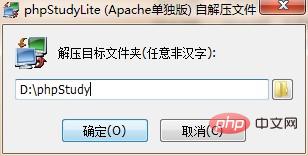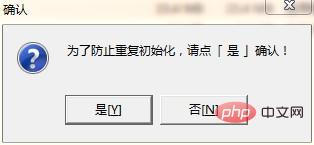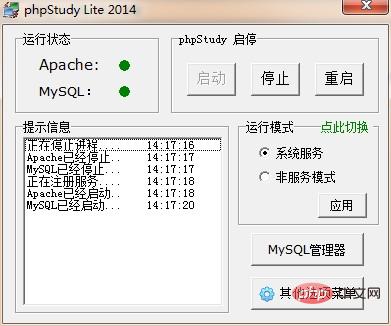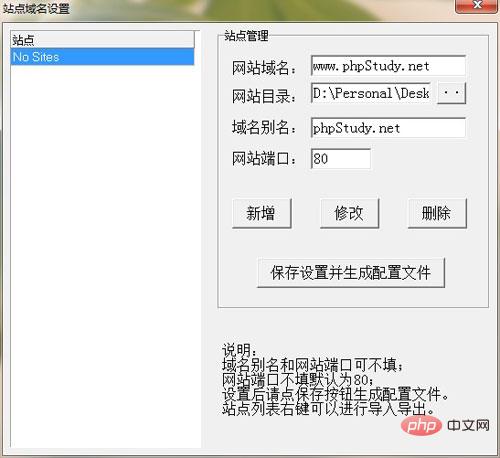
Many novice users who have just started learning PHP must have been exposed to integrated environments. Among the many integrated environments, PHPstudy is very good. It is a simple tool developed by a domestic team. The easy-to-use PHP integrated environment has accumulated a large number of users because of its simplicity of setting up a PHP environment with one-click installation.
Now PHPstudy not only supports the local PHP integrated environment, but also supports the win server side Server integrated environment, PHPstudy integrates various combinations such as php mysql apache nginx iis, etc. We can better switch its php integrated environment. Let's teach you how to use PHPstudy to build a local website.
First, Download PHPstudy
Go directly to the official website of PHPstudy to download. The official website address is http://www.phpstudy.net/. The latest version of phpstudy is currently It is PHPstudy2018. You can download the latest version. Of course, your system must keep up.
Second, Install PHPstudy
After downloading PHPstudy, just double-click and install it. The steps are as follows:
(1), Double-click to display the following interface.

If you need to change the directory, just change it here.
(2), here we choose the default, click OK, as follows:

(3), click "Yes (Y)" directly, and it will appear The following interface.
 、
、
Okay, PHPstudy has been installed at this time. You will understand the use of PHPstudy after playing with it for two days. There is nothing to say.
Three, Build a local site
After the installation is completed, the source code folder is WWW, place your source code in this folder
Four, Configuring PHPstudy
After we copy the site files, we need to configure PHPstudy so that it points to our local website, open PHPstudy, select other selection menus, and enter site domain name management ( This step can be ignored. The default access is: 127.0.0.1) as shown below:

is mainly the website directory. Be sure to select the site directory we just created. Everything else is Don't worry, click "Save settings and generate configuration file".
Fifth, Configuring the hosts file
Because the default domain name above is www.phpStudy.net, so here we also need to configure the hosts file, point it, and open it PHPstudy, select the other options menu, open hosts, edit or add the following code:
#localhost
127.0.0.1 localhost
127.0.0.1 phpStudy.net
127.0.0.1 www.phpStudy.net
Six, Install the php website source code
At this time, we can directly open www.phpStudy.net to install wordpress. The installation is very simple and will not be introduced here. If the source code we use is not WordPress, we also need to import the database. At this time, we need to use mysql database and other related tools. However, most of the excellent PHP source codes on the Internet are directly installed and imported. of.
Recommended tutorial: phpStudy quick entry video tutorial
The above is the detailed content of How to build a website in phpstudy. For more information, please follow other related articles on the PHP Chinese website!

Hot AI Tools

Undress AI Tool
Undress images for free

Undresser.AI Undress
AI-powered app for creating realistic nude photos

AI Clothes Remover
Online AI tool for removing clothes from photos.

Clothoff.io
AI clothes remover

Video Face Swap
Swap faces in any video effortlessly with our completely free AI face swap tool!

Hot Article

Hot Tools

Notepad++7.3.1
Easy-to-use and free code editor

SublimeText3 Chinese version
Chinese version, very easy to use

Zend Studio 13.0.1
Powerful PHP integrated development environment

Dreamweaver CS6
Visual web development tools

SublimeText3 Mac version
God-level code editing software (SublimeText3)

Hot Topics
 Why We Comment: A PHP Guide
Jul 15, 2025 am 02:48 AM
Why We Comment: A PHP Guide
Jul 15, 2025 am 02:48 AM
PHPhasthreecommentstyles://,#forsingle-lineand/.../formulti-line.Usecommentstoexplainwhycodeexists,notwhatitdoes.MarkTODO/FIXMEitemsanddisablecodetemporarilyduringdebugging.Avoidover-commentingsimplelogic.Writeconcise,grammaticallycorrectcommentsandu
 How to Install PHP on Windows
Jul 15, 2025 am 02:46 AM
How to Install PHP on Windows
Jul 15, 2025 am 02:46 AM
The key steps to install PHP on Windows include: 1. Download the appropriate PHP version and decompress it. It is recommended to use ThreadSafe version with Apache or NonThreadSafe version with Nginx; 2. Configure the php.ini file and rename php.ini-development or php.ini-production to php.ini; 3. Add the PHP path to the system environment variable Path for command line use; 4. Test whether PHP is installed successfully, execute php-v through the command line and run the built-in server to test the parsing capabilities; 5. If you use Apache, you need to configure P in httpd.conf
 PHP Syntax: The Basics
Jul 15, 2025 am 02:46 AM
PHP Syntax: The Basics
Jul 15, 2025 am 02:46 AM
The basic syntax of PHP includes four key points: 1. The PHP tag must be ended, and the use of complete tags is recommended; 2. Echo and print are commonly used for output content, among which echo supports multiple parameters and is more efficient; 3. The annotation methods include //, # and //, to improve code readability; 4. Each statement must end with a semicolon, and spaces and line breaks do not affect execution but affect readability. Mastering these basic rules can help write clear and stable PHP code.
 PHP 8 Installation Guide
Jul 16, 2025 am 03:41 AM
PHP 8 Installation Guide
Jul 16, 2025 am 03:41 AM
The steps to install PHP8 on Ubuntu are: 1. Update the software package list; 2. Install PHP8 and basic components; 3. Check the version to confirm that the installation is successful; 4. Install additional modules as needed. Windows users can download and decompress the ZIP package, then modify the configuration file, enable extensions, and add the path to environment variables. macOS users recommend using Homebrew to install, and perform steps such as adding tap, installing PHP8, setting the default version and verifying the version. Although the installation methods are different under different systems, the process is clear, so you can choose the right method according to the purpose.
 python if else example
Jul 15, 2025 am 02:55 AM
python if else example
Jul 15, 2025 am 02:55 AM
The key to writing Python's ifelse statements is to understand the logical structure and details. 1. The infrastructure is to execute a piece of code if conditions are established, otherwise the else part is executed, else is optional; 2. Multi-condition judgment is implemented with elif, and it is executed sequentially and stopped once it is met; 3. Nested if is used for further subdivision judgment, it is recommended not to exceed two layers; 4. A ternary expression can be used to replace simple ifelse in a simple scenario. Only by paying attention to indentation, conditional order and logical integrity can we write clear and stable judgment codes.
 Your First PHP Script: A Practical Introduction
Jul 16, 2025 am 03:42 AM
Your First PHP Script: A Practical Introduction
Jul 16, 2025 am 03:42 AM
How to start writing your first PHP script? First, set up the local development environment, install XAMPP/MAMP/LAMP, and use a text editor to understand the server's running principle. Secondly, create a file called hello.php, enter the basic code and run the test. Third, learn to use PHP and HTML to achieve dynamic content output. Finally, pay attention to common errors such as missing semicolons, citation issues, and file extension errors, and enable error reports for debugging.
 What is PHP and What is it Used For?
Jul 16, 2025 am 03:45 AM
What is PHP and What is it Used For?
Jul 16, 2025 am 03:45 AM
PHPisaserver-sidescriptinglanguageusedforwebdevelopment,especiallyfordynamicwebsitesandCMSplatformslikeWordPress.Itrunsontheserver,processesdata,interactswithdatabases,andsendsHTMLtobrowsers.Commonusesincludeuserauthentication,e-commerceplatforms,for
 how to handle undefined index in PHP
Jul 15, 2025 am 02:08 AM
how to handle undefined index in PHP
Jul 15, 2025 am 02:08 AM
The "undefinedindex" error occurs because a key that does not exist in the array is accessed. Solutions include: 1. Use isset() to check whether the key exists, which is suitable for processing user input; 2. Use array_key_exists() to determine whether the key is set, and it can be recognized even if the value is null; 3. Use the empty merge operator?? to set the default value to avoid directly accessing undefined keys; in addition, you need to pay attention to common problems such as the spelling of form field names, the database result is empty, the array unpacking is not verified, the child keys are not checked in foreach, and the session_start() is not called.






